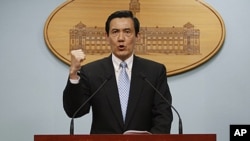Taiwan President Ma Ying-jeou has again pressed the United States to sell the island F-16 fighter jets and other military equipment, saying that such weapons help Taiwan level the playing field in its negotiations with China. Speaking in Washington by video-link, Ma outlined the ways he says Taiwan's policies toward China are helping improve bilateral relations.
Since coming to office nearly three years ago, President Ma Ying-jeou has made improving Taiwan's relations with China a top priority. He says his administration has made major strides in improving ties with China, especially in trade, tourism and cultural exchanges.
But Ma said Thursday that negotiating with China is not without its risks.
"The right leverage must be in place, otherwise Taiwan cannot credibly maintain an equal footing at the negotiating table," noted Ma. "This is why I continue to urge the U.S. to provide Taiwan with necessary defensive weaponry, such as F-16 C/Ds and diesel-powered submarines."
China opposes any sale of arms to Taiwan and frequently demands that the United States end its weapons sales to the island. China and Taiwan split after a civil war brought the Communist Party to power in Beijing in 1949. Beijing insists that the self-ruled island is part of its territory and has threatened to use military force against it, if Taiwan seeks formal independence.
Last year, after U.S. President Barack Obama announced the sale of a $6.4 billion arms package to Taiwan, which included Patriot missiles and Black Hawk helicopters, Beijing suspended military ties with Washington.
Under the Taiwan Relations Act, the United States is obligated to provide Taiwan with defensive weapons systems. Some military analysts say the F-16 fighter jet deal now under review by the Obama administration is being sidelined by concerns about how it would affect Sino-American relations.
In his video-link address at the Center for Strategic and International Studies here in Washington, President Ma repeated a point that U.S. Secretary of Defense Robert Gates has made that the United States can help itself by helping others defend themselves.
"In the end, only a strong U.S. commitment, backed by its credibility in East Asia, can guarantee the peace and stability of this region," added Ma.
Ma added that although the recent global economic downturn has affected Taiwan's defense budget, the island has earmarked more funds this year to help achieve its goal of creating a small but strong military and to purchase much-needed weapons systems.
One of the reasons Taiwan's economy is doing better, Ma said, is the policies his administration has implemented that have boosted trade and tourism with China.
"The arrival of nearly three million mainland Chinese visitors - up nearly 10 times - has created a tourism boom in Taiwan," Ma said. "The increase in cross-[Taiwan] strait trade has also boosted Taiwan's total trade volume to a record high of $526 billion in 2010."
But critics in Taiwan argue that Ma's policies make Taipei overly reliant on Beijing, which they say has only one goal, to force Taiwan to unify with the mainland. They also note that the improvement in bilateral ties has not substantially changed the way China treats Taiwan on the international stage.
Ma acknowledged that talks focusing on the political divide between Taiwan and China have yet to begin, but he noted that the agreements with China are helping to boost regional and global trade.
During the first quarter of this year, he said, trade with China increased by 15 percent, and trade rose by more that 30 percent with ASEAN member countries and the United States. President Ma said that although it might seem ironic that other countries are benefiting from closer ties between Taipei and Beijing, that is exactly what Taiwan wants.




